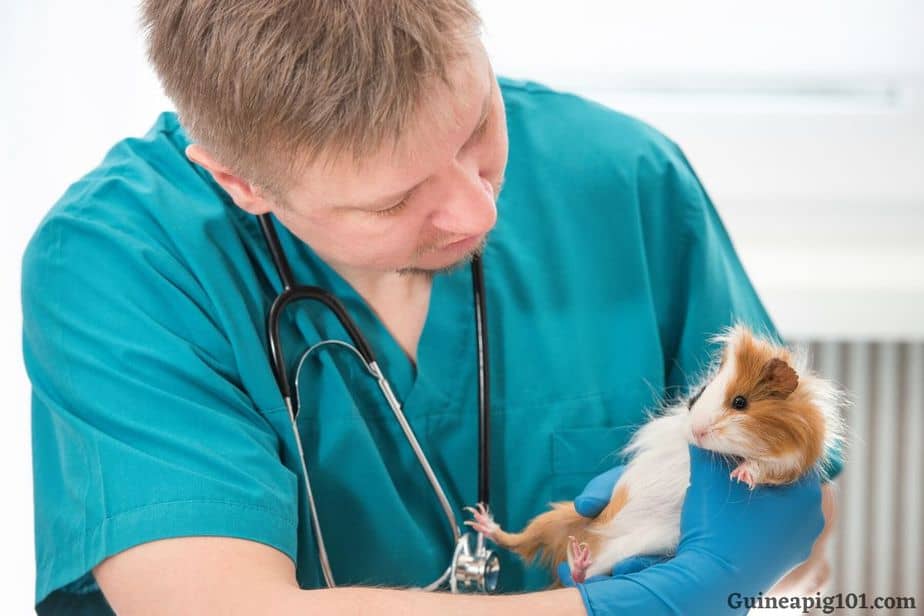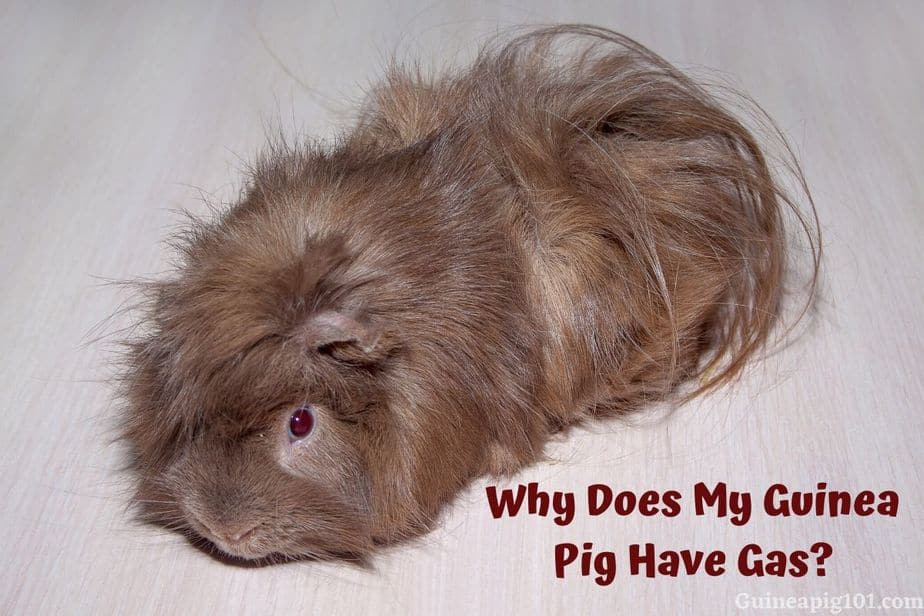A guinea pig will pass gas as fart occasionally. It is quite natural for guinea pigs to have gas occasionally. But if your guinea pigs have gas regularly then it might be a matter of concern. I have often wondered why does my guinea pig have gas so frequently.
So, as a curious guinea pig owner I did some research, and here is what I have learned.
An inappropriate diet is the most likely cause of gas in guinea pigs. A high-carb diet or too much sugar in the diet can often result in the formation of gas in guinea pigs. Other causes of gas in guinea pigs include stress, dehydration, and eating quickly.
Gas in guinea pigs could be caused by eating certain foods such as cabbage, cauliflower, broccoli, etc. Therefore, it is better if given in a moderate amount.
Perhaps, gas in guinea pigs is severe and fatal because it cannot pass away through their gastrointestinal tract and thus remain in their intestine, causing severe pain.
Bloating or gas in guinea pigs, if untreated, they can cause a severe health problem called GI stasis, where the intestine slows down and stops entirely eventually.
If your guinea pigs are avoiding eating and drinking for a while, then take it as a sign of gas formation and prevent it by seeing a veterinarian before it goes any severe.
Guinea pig stomach making noises
If you put your ear close to your pet’s stomach and it makes you hear some soft babbling noise, then it’s an indication of some ongoing food process in your pet’s tummy, which is undoubtedly not something to be worried about.
Whereas, if the pet’s stomach is either making no noise or some loud noises, then it’s something to be of concern about.
Guinea pigs stomach undeniably will create some sort of noise while processing the food down.
Nevertheless, no noise will simply suggest that there is no food processing activity going on in them, while loud noise would reasonably suggest the building up of gas.
In some, gas is more prone and severe. Notably,the type of breed, size, and structure does not influence gas formation.
Gas is primarily being formed due to the quantity of food and the type of food consumed.
Can guinea pigs pass gas?
No, they cannot pass gas naturally. That makes it more severe in their case.
The gastrointestinal tract of guinea pig follows the following path:
- The primary digestion of food starts in the small intestine.
- In the small intestine, all the essential nutrients are absorbed and afterward are passed on to blood vessels.
- Through the small intestine, the food reaches the caecum.
- Caecum absorbs all the essential nutrients and ferments the food further towards the large intestine for elimination.
- The fermentation of food produces gas.
- The cecum passes this gas to the colon.
- The gas thus produced stays in the gastrointestinal tract and cannot be moved further.
If your pet has decreased its appetite or is not eating at all, and have become inactive, then they should be assisted by a vet immediately.
How to tell if a guinea pig is bloated?
Guinea pigs are food lovers, and if in any case they have stopped eating or are avoiding food, this should be evident enough for you to guess that there is certainly something not right about your pet.
In bloating, you can see noticeable swelling around your pet’s abdominal area, and this would be a clear hint for you to imagine that your guinea is bloated.
Other significant changes that you might observe are reduction in their activity and movement, weakness, stool reduction, uneasiness, and heavy breathing.
If your pet has not eaten in more than 5-6 hours, then immediately see a vet, procrastinating it more might be too risky for your guinea pigs.
Foods that cause gas in guinea pigs
Food is the primary reason for building up of gas in guinea pigs.
Fiber is the main component that guinea pigs require. It is essential for the healthy functioning of the stomach and therefore ensures smooth digestive movement.
Don’t worry if your guinea pig’s stomach makes some sort of noise because it is a sign of the ongoing digestive process.
Do not feed the adult guinea pigs with an excess of pellets. Excessive protein in pellets might cause bloating in them.
Avoid or limit feeding your guinea pigs with foods, like cabbage, cauliflower, broccoli, bok choy, and considerably don’t give them fresh grass if they aren’t used to it.
Provide your pet with plenty of fiber-enriched food and water because it flushes out the system and prevents the production of bloating or gas.
Other causes of gas in guinea pigs
Despite a proper diet if your guinea pig still has gas accumulation, then the following would be the most suitable reasons for so to happen:
- Swallowing food too quickly.
- Stress
- Dehydration
If there is no if’s and but’s with their diet, then your pet is certainly not paying enough attention to their food than they should.
Guinea pig eating too fast
How fast your guinea pigs eat is as important as what they eat. Gulping of food or drinks will create air embolism in them, which causes indigestion.
And this air or gas produced cannot exit through their mouth or anus and thus stays in the gastrointestinal tract of guinea pigs, further causing bloating.
The possible reasons for eating quickly could be out of hunger, stress, and palatability(choosing and eating the same food, which gives them pleasure).
Thus, provide your guinea pigs with hay at all times and small servings of vegetables 1-2 times a day.
If your pet shares a cage with another mate, then they might be very conscious about their food, which is their natural tendency.
Guinea pigs also do follow a dominant-submissive hierarchy. The dominant mate will always eat first. So, the submissive one would try eating their food as quickly as they can in fear of being snatched away.
Do consider and check what food you serve to your guinea pigs. They are food beggers and will never say no to any treats.
But it’s you who needs to decide as a guinea pig owner and take care of what should be provided and what shouldn’t.
Plan a proper timing for food like vegetables and treats. Preferably feed all your guinea pigs separately to avoid chaos. Make sure guinea pigs are taking their daily required fiber intake in the form of hay and grass.
Stress causes gas in guinea pigs
Guinea pigs are fond of companionships, which makes sure of their emotional wellbeing. Any sort of emotional stress will affect the thyroid gland directly.
Emotional stress will increase the activity of the thyroid gland, which will produce gas ergo due to the overstress attitude.
Guinea pigs are not good enough when it comes to dealing with stress. There could be so many factors that could trigger stress in them. These includes:
- A modification in their daily routine or habits.
- Losing a cagemate.
- Vulnerability to predators.
- Rehoming.
- Reduce mobility.
- Absence of a partner.
- Physical pain.
- Bad experiences.
Try and make their life more enriched and fulfilled with good experiences, love, care, and support.
Dehydration causes gas in guinea pigs
Water is essential in the prevention of gas formation. It maintains the electrolyte balance in the body. Their body will tend to keep substances that water already has present in it, which will cause gas.
If your guinea pig is eating well but avoiding drinking, then there must be something wrong with the water either. It doesn’t taste well or is contaminated.
All creatures need water and so do the guinea pigs. Water is not only essential for relief in gas but also extremely important for survival.
Add something sweet in their water bottle and encourage them to drink.
If they do not drink at all despite this experiment, you must immediately take your guinea pigs to the vet for a check-up. This could be a wake-up alarm for GI stasis.
How do you treat bloat in guinea pigs at home?
Check your pet’s temperature; if it’s below 37 degrees Celsius, then it’s a frightening sign.
Try and raise your pet’s temperature, and there are several ways to do it.
- Bring your guinea pigs close to you and share the body heat.
- Keep a warm water bag underneath them.
- Light a candle or lamp in your presence around guinea pigs cage to provide warmth.
- Wrap them up loosely in a towel or something.
- Encourage them to drink more water.
Gently wrap your guinea pigs in a towel to give a gentle massage.
Do not feed any veggies, but serve hay and plenty of water.
Give everything in moderation too much of everything will cause gas in them.
Plus, do not give excess vegetables and do not force them for too much exercise; either side is not right.
If your guinea is facing the gas problem for very long, better get them treated through a vet; otherwise, they would risk their lives.
Bloating results in reduced appetite and strength. So, after your guinea pig is treated, show them your love by offering them all their favorites, but in mindful quantity.
How do you relieve gas in guinea pigs?

There are two ways you can relieve gas in guinea pigs. These includes:
Relieving gas through medication
One way to reduce gas in guinea pigs is fluid therapy, in which they are required to drink fluid as much as they can.
Uncertainly, if the former cannot be achieved, then they are given injections under their skin.
Bloating in guinea pigs cannot escape the gastrointestinal tract through any opening, which thereby causes severe pain, and must be given some medications for the same.
To get relief from pain, medications such as carprofen, meloxicam, etc. are given, which are vital for the curing GI stasis.
The pain is so severe that it causes intestinal immobility, weakness, restlessness in them.
There are other drugs called cisapride and metoclopramide, elevating intestinally and stomach motility, gastric movements, and help in emptying the intestine.
They must also be given antibiotics to prevent any bacterial growth.
Seeking a vet for help
If you are failing to treat your guinea pig on your own, then it’s advisable to go and see a vet ASAP.
A vet will perform some tests and procedures on your guinea pig to find the root cause of the problem.
At first, they will try to deal with the situation by engaging your guinea pig in some liquid consumption or would otherwise inject some syringes or giving some sort of medication.
If the gas issue is still not resolved, at last, they will prepare for a surgery, which would be a little costly to your pocket and will also come with a lot of risks.
Why is my guinea pig farting a lot?
Well, that may be because you are giving your guinea pigs an inappropriate diet.
Excessive intake of food is very likely to produce gas in them. It could further lead to farting.
Too many carbohydrates, processed food, sugar, or even the healthiest of food can cause fart.
Apart from eating habits, other factors influence fartings, such as stress and dehydration.
Though farting is a natural process for all living beings, too much of it could be fatal in guinea pigs and can give rise to a severe GI stasis condition.
Anyway, farting could be avoided by giving appropriate meals at appropriate timing.
Sources: Gastrointestinal diseases in guinea pigs, Bloated guinea pig radiograph, gastrointestinal hypomotility stasis in guinea pigs.
